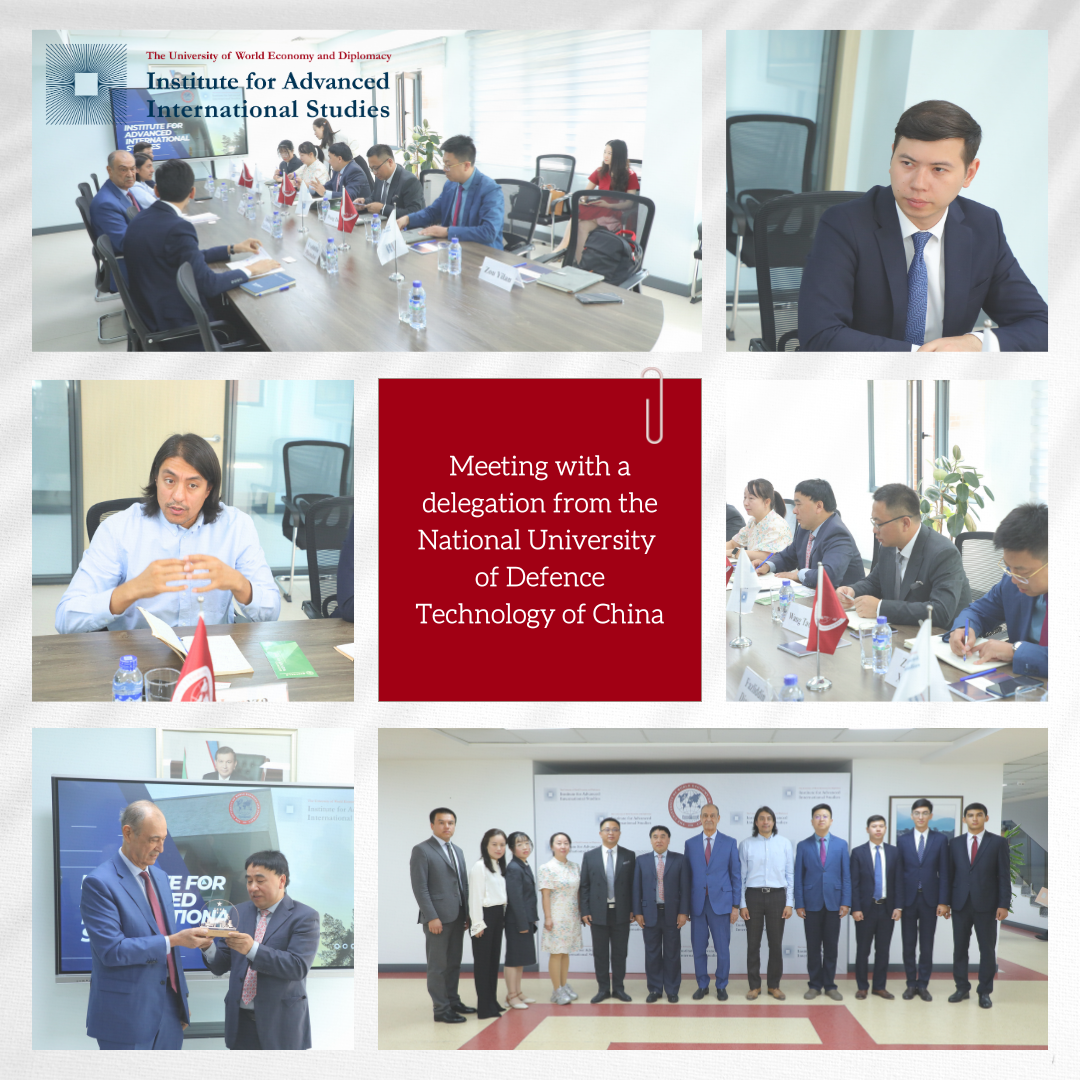
Tashkent, Uzbekistan – 10 September 2024. On 9 September, the University of World Economy and Diplomacy (UWED) hosted a pivotal meeting between Dr Abdusamat Khaydarov, Director of the Diplomatic Academy at UWED, and a distinguished delegation from China’s National University of Defense Technology (NUDT), led by Professor Ma Jianguang, Director of the Centre for International Studies. The Chinese delegation included senior staff members Du Yanyun, Wang Tao, Liu Shuaiyi, Zou Yilan, and Zhang Xiubo. Additionally, UWED’s Institute for Advanced International Studies (IAIS) was represented by Mr Hamza Boltaev, Mr Islomkhon Gafarov, and Mr Fazliddin Djamalov.
Dr Khaydarov opened the meeting by offering an in-depth overview of UWED and Diplomatic Academy’s educational frameworks and the extensive research activities conducted at IAIS, particularly within its thematic and regional research centres. Professor Jianguang responded by emphasising NUDT’s growing interest in fostering practical cooperation with UWED, recognising its academic prestige and its strategic position in Central Asia. According to Professor Jianguang, the principal aim of this visit was to explore collaborative educational and research initiatives, particularly in the social sciences and cutting-edge technologies such as supercomputing, navigation systems, and high-power lasers, and their broader implications for international relations.
Highlighting China’s expanding focus on Central Asia, Professor Jianguang invoked H. Mackinder’s famous geopolitical dictum: “Whoever owns Heartland [Central Asia] owns the World Island, whoever owns the World Island owns the world.” This strategic context framed the Chinese delegation’s proposals for bilateral collaboration, including student and faculty exchange programmes, co-authored research publications, and the organisation of joint academic workshops. Additionally, the Chinese side mooted the possibility of launching bilateral expert consultations on Central Asia’s relations with major global powers such as China, Russia, the United States, and the European Union, as well as its role within multilateral frameworks like the Shanghai Cooperation Organisation (SCO) and BRICS. In furtherance of this, Wang Tao extended an invitation for Uzbek scholars to contribute to the journal of NUDT.
Professor Jianguang also informed the UWED delegation about the upcoming Xiangshan Security Forum, set to take place in Beijing on 13 September. This biennial event will focus on the intersection of high technology and geopolitics. In turn, IAIS experts invited the Chinese delegation to participate in their international conference on artificial intelligence, scheduled for October this year.
During the meeting, Du Yanyun, a research fellow at NUDT’s Centre for International Studies, provided a detailed perspective on the Belt and Road Initiative’s impact in Central Asia. She stressed that large-scale infrastructure projects, such as the energy ventures and the construction of the China-Kyrgyzstan-Uzbekistan and China-Kyrgyzstan-Afghanistan-Pakistan railways, are critical to promoting regional stability by enhancing connectivity between Central and South Asia. Both sides concurred on the importance of these projects in contributing to the economic development of Afghanistan. However, Professor Jianguang expressed concern regarding the strengthening influence of the United States in the region despite its military withdrawal from Afghanistan in 2022, which has created new geopolitical dynamics that are closely monitored by China.
In closing, both parties affirmed their commitment to further academic and diplomatic cooperation, expressing optimism about building a long-lasting partnership between UWED and NUDT. The potential for deeper engagement with Chinese research institutions was widely acknowledged, laying the groundwork for fruitful bilateral relations in the years to come.
For reference, the National University of Defense Technology, originally founded in 1953 in Harbin as the Military Engineering College of the Chinese People’s Liberation Army, stands as a preeminent institution in China’s defence and technology sector. Its Centre for International Studies, established in 2013, has produced over 150 publications in leading outlets such as People’s Daily, Xinhuanet.com, Qiushi Net, China Military Network, and China Social Science Network.